Americas
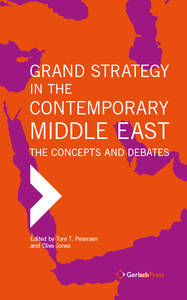
Grand Strategy in the Contemporary Middle East
The Concepts and Debates
Tore T. Petersen, Clive Jones (eds.) – 2022
This unique volume explores the role that Grand Strategy has played in the shaping of the Middle East and why, conceptually, its core principles still have traction in explaining the shifting alliances and dispensation of power across the region. When so much of the spatial as well as the geo-political boundaries of the Middle East are in flux, it is now time to revisit the very ideas that inform Grand Strategy that once again, are enjoying a wider intellectual renaissance in world affairs. Through a longitudinal met...
more »
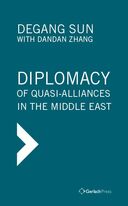
Diplomacy of Quasi-Alliances in the Middle East
with a foreword by Tim Niblock
Degang Sun, Dandan Zhang – 2020
Quasi-alliance refers to the ideation, mechanism and behavior of policy-makers to carry out security cooperation through informal political and security arrangements. As a “gray zone” between alliance and neutrality, quasi-alliance is a hidden national security statecraft. Based on declassified archives and secondary sources, this book probes the theory and practice of quasi-alliances in the Middle East. Four cases are chosen to test the hypotheses of quasi-alliance: - the Anglo-French-Israeli quasi-alliance during the Suez...
more »
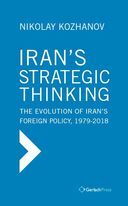
Iran’s Strategic Thinking:
The Evolution of Iran’s Foreign Policy, 1979-2018
Nikolay Kozhanov – 2018
What are the ideological motives behind Iran’s foreign policy? This new study examines Tehran’s twin desires to protect national interests and to project real power. Factors determining Iran’s foreign policy include: - Potential economic leader of the Middle East region - Key player in the oil and gas market - Centre of resistance against global Western domination - US and Israel policy - Syria as the bridge to Lebanon and Palestine There is a strong focus on primary sources, as well as interviews with EU, Russian and Middle...
more »
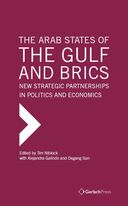
The Arab States of the Gulf and BRICS:
New Strategic Partnerships in Politics and Economics
Tim Niblock, Degang Sun, Alejandra Galindo (eds.) – 2016
How the Gulf Cooperation Council (GCC) relates to BRICS (Brazil, Russia, India, China, and South Africa) is, in the light of the growing strength and importance of this organisation and the countries which comprise it, of critical importance. The issue is not simply how the GCC countries handle their relations with the individual BRICS countries, but more importantly how they relate to an alternative structure of coordination and perhaps power in the global order. Their established links and alliances may no longer be enough...
more »
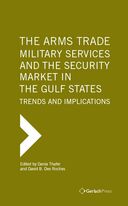
The Arms Trade, Military Services and the Security Market in the Gulf States: Trends and Implications
David B. Des Roches, Dania Thafer (eds.) – 2016
The Gulf is in the first rank of potential global flashpoints. It is the largest market for weapons imports in the world, and is considered to be a vital interest of all the great powers. Iran is viewed as an expansionist threat by the Arab states of the Gulf, who have built considerable militaries in a historically short timeframe. Security in the Gulf, however, is a complicated matter. The Arab states of the Gulf have pursued different defense policies as well as different ways of building up their forces. In some instance...
more »
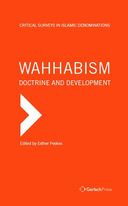
Wahhabism - Doctrine and Development
Set, Volumes 1-2 (Critical Surveys in Islamic Denominations)
Esther Peskes (ed.) – 2016
Saudi Arabian Wahhabism is the ultra-puritanical form of Sunni Islam which has been adopted by Islamist radicals, Salafists, and jihadists to legitimize and spread their extremist agenda. The scholarly articles in these two volumes throw fresh light on this messianic radicalism by tracing its origins in the 18th century up to its present role as the authoritative interpretation of Islam in the strategically vital Kingdom of Saudi Arabia. - Volume 1 focuses on the main tenets of Wahhabi doctrine that brought about the Wahhabi...
more »
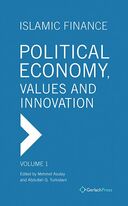
Islamic Finance: Political Economy, Values and Innovation
Volume 1
Mehmet Asutay, Abdullah Q. Turkistani (eds.) – 2016
Islamic finance has had a transformational impact on markets well beyond the Muslim world. This development has been the outcome of various stakeholders and agencies interacting to develop a political economy based on Islamic values to generate religiously and culturally authentic financial institutions and instruments. The studies presented in this volume discuss these interactions through specific examples from the GCC countries, supported by comparative perspctives, in order to articulate the development and consequences...
more »
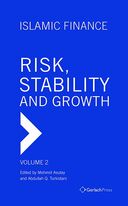
Islamic Finance: Risk, Stability and Growth
Volume 2
Mehmet Asutay, Abdullah Q. Turkistani (eds.) – 2016
In response to the recent global financial crisis, Islamic finance, as a religiously authentic proposition, has shown resilience throuh its inherited principles such as risk sharing and the avoidance of speculation. Such approaches have provided stability, which in turn has brought unprecedented growth to the sector. The studies in this volume focus on examples in the GCC countries to provide empirical analysis of the risk aspects of Islamic finance, to test its stability, identify its growth trajectories, and measure its im...
more »
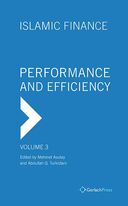
Islamic Finance: Performance and Efficiency
Volume 3
Mehmet Asutay, Abdullah Q. Turkistani (eds.) – 2016
The growth, stability and resilience of Islamic finance is now a well established fact. However, in order to achieve sustainable growth the Islamic finance industry has to be able to maintain its competitive edge by generating higher efficiency and performance. The studies in this volume aim at providing empirical and comparative perspectives on the performance and efficiency of the Islamic finance industry through a number of econometric models, with a specific focus on the GCC countries supported by comparative cases....
more »
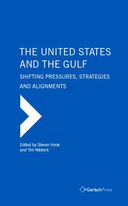
The United States and the Gulf:
Shifting Pressures, Strategies and Alignments
Steven W. Hook, Tim Niblock (eds.) – 2015
The Gulf region’s relations with the outside world are changing radically. The Gulf’s major trading partners are now no longer predominantly Western. China, in particular, now has a significant stake and highly critical interests in the region. The United States still dominates the security field, yet its Gulf allies have come to doubt the strength of US commitment. Meanwhile the Arab monarchies of the Gulf are struggling to cope with multiple divisions, problems and threats: the radical forces of change unleashed by the Ara...
more »
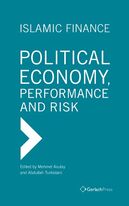
Islamic Finance - Political Economy, Performance and Risk.
Set, 3 volumes
Mehmet Asutay, Abdullah Q. Turkistani (eds.) – 2015
This collection of new research brings together state of the art thinking by 45 experts from academia and business on all key aspects of Islamic Finance. Individual volumes deal with the key issues of: Political Economy, Values and Innovation; Risk, Stabilty and Growth; Performance and Efficiency. - Volume 1 Political Economy, Values, and Innovation - Volume 2 Risk, Stability and Growth - Volume 3 Performance and Efficiency...
more »
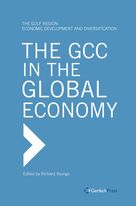
The GCC in the Global Economy
Richard Youngs (ed.) – 2013
Changing geopolitical realities have seen the Gulf region turning to Asia and Africa to build new economic links, while strengthening old ones. This proactive internationalism is visible not just in economics and energy, but also in politics and security where a host of new agreements has been developed. This work provides an overview of the ways in which the GCC states now need to move ahead with reforms that will reflect issues such as raised expectations from a period of high revenues and the region's demographics. T...
more »
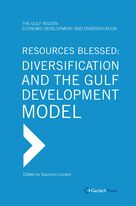
Resources Blessed: Diversification and the Gulf Development Model
Giacomo Luciani (ed.) – 2013
The Gulf countries have adopted a unique combination of policies to encourage diversification with largely positive results, while there are significant distinctions between the individual cases. This work evaluates various examples to show the extent to which the Gulf economies have diversifed to date, and how results can be measured, taking into consideration factors such as composition of GDP or exports; government services; and the categorization of industrial activities downstream of resources extraction (oil refining, ...
more »
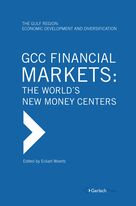
GCC Financial Markets: The World's New Money Centers
Eckart Woertz (ed.) – 2013
Bond markets in the GCC countries are underdeveloped, and the capital mix is heavily skewed towards banks, while ambitious development plans in fields like petrochemicals and infrastructure, as well as a rapidly growing population, create an increased need for finance. This study outlines the structure of various segments of GCC financial markets and points to regulatory challenges and future developments, ranging from capital market structures to the planned GCC Monetary Union, Islamic banking, and sovereign wealth funds. T...
more »
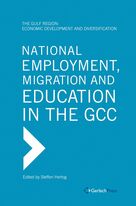
National Employment, Migration and Education in the GCC
Steffen Hertog (ed.) – 2013
This volume provides a cross-cutting analysis of the policy challenges related to GCC labor markets. It analyzes the different dimensions of segmentation of these markets, factors of change influencing labor supply such as trends in education and demography, as well as the impact of potential future reforms in areas such as immigration policy, labor sponsorship, taxation and minimum wages. The work therefore provides an overview of what arguably will be the core socio-economic challenge for the GCC in the coming years....
more »

The Gulf Region: Economic Development & Diversification.
Set, Volumes 1-4
Giacomo Luciani, Steffen Hertog, Eckart Woertz, Richard Youngs (eds.) – 2012
The four volumes in this major research collection address the key economic issues which affect the future development and diversification of the member states of the Gulf Cooperation Council (GCC), namely Saudi Arabia, Kuwait, Bahrain, Qatar, UAE and Oman. Specifically, this recent research covers Economic Diversification, Development of Global Partnerships, Labor Markets and Migration, and Financial Markets as Global Players The work brings together state-of-the-art analysis by some 40 international scholars who participat...
more »



